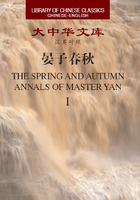
2.5 [30] 景公冬起大台之役晏子谏
齐景公冬天兴起修建大台的劳役,晏子进谏
【原文】
晏子使于鲁,比其返也,景公使国人起大台之役。岁寒不已,〔役之〕冻馁(之)者乡有焉,国人望晏子。晏子至,已复事,公(乃)〔延〕坐,饮酒乐,晏子曰:“君若赐臣,臣请歌之。”歌曰:“庶民之言曰:‘冻水洗我,若之何?太上靡散我,若之何?’”歌终,喟然(叹而)流涕。公就止之曰:“夫子曷为至此?殆为大台之役夫!寡人将速罢之。”晏子再拜,出而不言,遂如大台,执朴鞭其不务者,曰:“吾细人也,皆有盍庐,以避燥湿,君为一台而不速成,何为?”国人皆曰:“晏子助天为虐。”晏子归,未至,而君出令趣罢役,车驰而人趋。仲尼闻之,喟然叹曰:“古之善为人臣者,声名归之君,祸灾归之身。入则切磋其君之不善,出则高誉其君之德义。是以虽事惰君,能使垂衣裳,朝诸侯,不敢伐其功。当此道者,其晏子是耶!”
【今译】
2.5 [30] DUKE JING LAUNCHED A CONSCRIPT LABOR PROJECT TO BUILD A LARGE TERRACE IN W INTER. YANZI REMONSTRATED.
Yanzi was sent on a mission to Lu. Before his return,Duke Jing had conscripted the people of his state for a labor project to build a large terrace. The w intry cold at the end of the year was unrelenting,and conscripted laborers from all the villages were freezing and hungry. The people looked to Yanzi for salvation.
When Yanzi arrived and finished reporting on the completion of his mission,the Duke invited him to sit down to have a drink and entertain himself.
Yanzi said,“If you,my Lord,grant me permission,I would like to sing a song,” and he sang:
The words of the simple people say:
‘Freezing water washes us,
what can we do about it?
The Supreme Ruler disperses us;
what can we do about it?’
A t the end of the song,he sighed heavily and wept. The Duke moved toward Yanzi to stop him and said: “Master,how have you come to this? Perhaps it is because of the conscript labor at the large terrace? I w ill discontinue it immediately.”
Yanzi bowed tw ice. A fterwards,he left w ithout saying a word and went to the site of the large terrace. He seized a cane and flogged those who did not attend to their work and said: “We are slight people,and we all have our own small cottages,where we can shut ourselves up to escape the heat and the damp. Our Lord wants one terrace built and it is not finished promptly. What is the reason for this?”
A ll the people of the state said: “Yanzi is helping Heaven to inflict cruelties.”
W hile Yanzi was on his way back,the Duke issued an order to immediately discontinue the conscript labor. Chariots hastened forward and people rushed away.
When Confucius heard about this,he heaved a deep sigh and said: “Those in ancient times who were good as ministers ascribed fame to their rulers’ credit and ascribed disaster to their own discredit. When they entered for an audience,they reprimanded their rulers for doing what was not good,but upon exiting they praised them highly for their virtue and righteousness. For that reason,even when they served negligent rulers,they made it possible for the rulers to let their clothes hang down loosely, and when they summoned the regional princes for an audience to their court,they did not presume to boast of their own achievements. Yanzi is indeed someone who undertook that very way—is he not?”
and when they summoned the regional princes for an audience to their court,they did not presume to boast of their own achievements. Yanzi is indeed someone who undertook that very way—is he not?”
注释
[1]A metaphor for the effortless way in w hich the legendary em perors such as the Yellow Emperor and Yao and Shun achieved perfect rulership. See Zhouyi 周易,66/82/5.